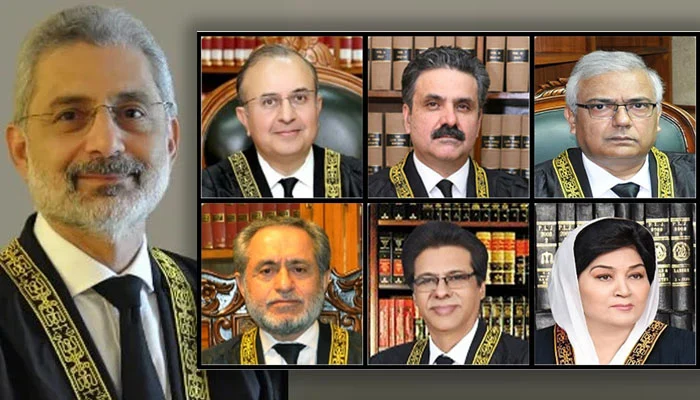ISLAMABAD: According to Chief Justice of Pakistan (CJP) Qazi Faez Isa, the Supreme Court hopes to wrap up the lifetime disqualification case on Thursday, January 4. This is a significant ruling that will establish whether or not lawmakers’ ineligibility to run for office under the amended Election Act 2017 should be for five years, as per Article 62 (1)(F).
A seven-person higher court, presided over by Pakistan’s Chief Justice (CJP) Justice Qazi Faez Isa, considered the issue of parliamentarians’ permanent disqualification.
Justice Syed Mansoor Ali Shah, Justice Yahya Afridi, Justice Aminuddin Khan, Justice Jamal Khan Mandokhel, Justice Muhammad Ali Mazhar, and Justice Musarat Hilali are the other members of the court.
Live coverage of the case hearings was available on SC’s website.The chief justice noticed a discrepancy between its ruling and the laws pertaining to the lifetime disqualification that were made through an amendment to the Election Act on December 11, 2023, while presiding over a three-member bench hearing a case involving the disqualification of a former PML-N provincial lawmaker, Sardar Meer Badshah Khan Qaisrani.
The chief judge had noted that the modifications made to the Election Act of 2017 and the ruling on lifetime disqualification by the Supreme Court could not coexist.
He went on to say that the Elections Act will be governed by either the Supreme Court’s ruling or the laws passed by parliament.
In 2018, the Supreme Court ruled that any individual disqualified under Article 62(1)(f) of the Constitution
In 2017, the Supreme Court ruled that former prime minister Nawaz Sharif and later Pakistan Tehreek-e-Insaf (PTI) leader Jahangir Tareen were ineligible for office under Article 62(1)(f) of the Constitution.
The court determined that Nawaz was unable to hold his position because he had lied to both the parliament and the courts.
He was then given ten years in the Avenfield flats and seven years in Al-Azizia references by an accountability court.
But after the former prime minister came home, the Islamabad High Court cleared him in both instances.
The Elections Act of 2017 was amended in 2023 by the PDM coalition government, reducing the legislator’s five-year retroactive disqualification period.
Given that general elections are being held, this is a very important issue.
However, the majority of PML-N candidates, including its supremo, Nawaz, had their nomination papers accepted by the electoral body. This prompted PTI officials to criticize the commission’s work.
The hearing
Attorney General for Pakistan (AGP) Mansoor Usman Awan begged the bench to reconsider its ruling about the lifetime disqualification at the beginning of the hearing.
At this point, CJP Isa questioned the AGP about which he thought should take precedence: the Supreme Court’s decision on lifetime disqualification or the modified Election Act of 2017?
The AGP declared that he would back the federal government’s enactment of the Election Act 2017.
The AGP did note that unless the Supreme Court’s decision is upheld, the pronouncement of lifetime disqualification will stay in effect.







